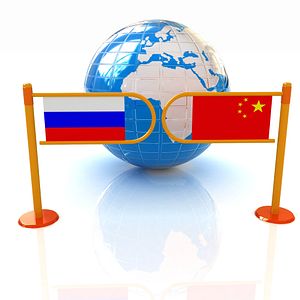Russia’s Foreign Minister, Sergey Lavrov, was in China Tuesday. During his visit, Lavrov held meetings with Chinese Foreign Minister Wang Yi as well as President Xi Jinping. According to a Chinese Foreign Ministry spokesperson, Lavrov’s visit was primarily designed to “lay the groundwork” for President Vladimir Putin’s scheduled visit to China in May. In addition to paying an official state visit, Putin will also attend the quadrennial Conference on Interaction and Confidence Building Measures in Asia (CICA) Summit, to be held in Shanghai.
China and Russia have been working hard to tighten their relationship, especially since Xi Jinping assumed the presidency in March 2013. Since then, Xi has visited Russia three times, most recently to attend the opening ceremony of the Sochi Olympics. Russia was, in fact, the destination chosen for Xi’s very first trip abroad, symbolizing the importance Xi and China’s government place on ties with Moscow.
During his meeting with Lavrov, Xi Jinping said that relations between China and Russia “are at their best” and have played “an irreplaceable role in maintaining world peace and stability.” China’s Foreign Ministry dubbed China-Russia ties the “major-country relationship that boasts the richest contents, the highest level and the greatest strategic significance.” Of course, China’s other main “major-country relationship” is with the United States—spokesperson Hua Chunying was implicitly contrasting the progress in China-Russia relations with recent tensions in the China-U.S. relationship.
In terms of moving the relationship forward, Xi called for “enhanced political mutual support” between China and Russia. Lavrov responded that China and Russia’s “bilateral strategic partnership of coordination has global influence.” Many analysts have theorized that China backs Russia on controversial international issues (such as blocking UN Security Council resolutions dealing with the Syrian civil war) in hopes of gaining similar Russian support for problems of deep concern to China. Xi and Lavrov’s words hint at this give-and-take relationship, which keeps either country from being isolated in the face of opposition from the West.
However, China-Russia relations are not simply mercenary tit-for-tat diplomatic transactions. Russia and China also share a philosophical distaste for Western doctrines that imply a ‘global policeman’ function. One such example is “responsibility to protect,” which calls on the world to interfere in specific countries to prevent a humanitarian crisis. Both Russia and China (frequently targets of human rights criticisms themselves) reject the West’s emphasis on human rights and have a vested interest in keeping such principles out of the international governance system. In general, China and Russia seek to forestall most international actions targeting a specific state, whether that involves military intervention, economic sanctions, or simply a strongly worded verbal reprimand by the UN.
Long term, Beijing and Moscow also seek to foster a global order that has room for more than one superpower. In fact, opposition to a U.S.-dominated world order seems to be a major factor uniting China and Russia, as both seek world recognition as great powers with the accompanying global clout.
Accordingly, China and Russia have jointly emphasized several regional organizations, including CICA as well as the Shanghai Cooperation Organization (SCO), which Beijing and Moscow hope can play defining roles in Asian multilateral governance. Tying Putin’s first state visit to China with the 2014 CICA summit (held only once every four years) underlines this gathering’s importance for China-Russia relations. CICA especially will allow China and Russia, the two dominant regional powers, to shape an agenda for dealing with Asian security issues.
The timing for the upcoming CICA summit is especially poignant, as most Western countries want nothing to do with Putin these days, due to outrage over the annexation of Crimea. For example, a G8 meeting scheduled to be held in Sochi has been cancelled, to be replaced by a G7 meeting in Brussels that Russia is not invited to attend. CICA, however, will continue as planned with Russian participation.
As for the Ukraine issue itself, Xinhua included a mention only as an afterthought at the very end of the article: “During the meeting, Lavrov briefed with Xi about Russia’s stance on the Ukraine issue. Xi also elaborated on China’s position on the issue.” For China, the less said about Ukraine, the better.

































